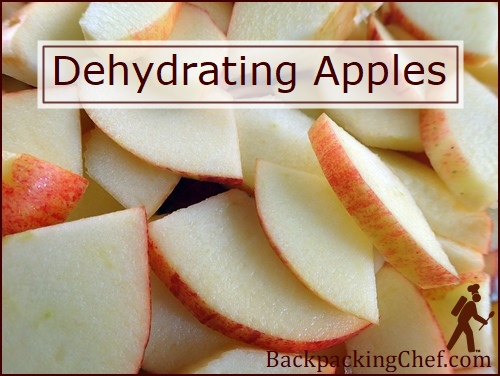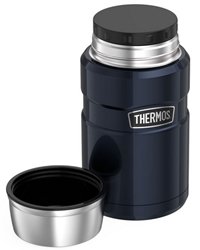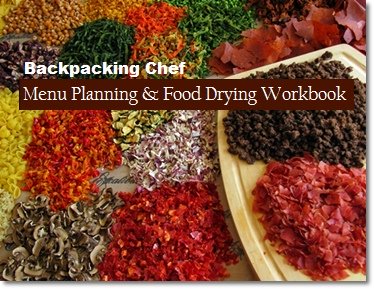Dehydrating Apples
This page covers five fun methods of dehydrating apples.
Drying apples in slices is a favorite method, but you can also dehydrate apples that are grated, baked in the oven, cooked on the stovetop, or blended into applesauce for fruit leather.
Dehydrated apple recipes that you're going to love include Tortilla Apple Tarts, Bircher Muesli, Pumpkin Spice Apples, and Applesauce.
Table of Contents
Dehydrating Sliced Apples
For snacking on dry or rehydrating with hot or cold water. Perfect for an afternoon fruit cocktail.
Dehydrating Grated Apples
Wonderful as a dried snack with a hint of lemon, and also great in Hot Tortilla Apple Tarts and No-cook Bircher Muesli.
Dehydrating Baked Apples
Truly amazing… Cinnamon Spice Apples baked and dehydrated. A delicious trail dessert served hot, or try it at home a la Mode with ice cream.
Dehydrating Apples Cooked on Stovetop
Apples cooked on the stove, alone or in combination with apricots, creates extra juice and sweetness. Perfect with Backpacker Pancakes.
Dehydrating Applesauce
Tear applesauce leather into pieces for snacking, or rehydrate it back into applesauce with hot or cold water.
Ask Chef Glenn FAQ about dehydrating apples.
Dehydrating Apples – Fresh Sliced
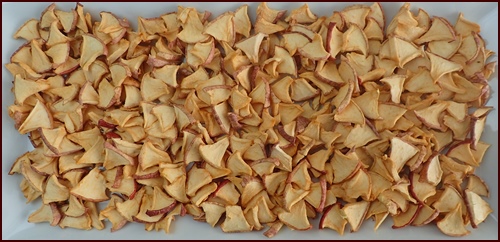
Photo above: Dried apple slices after storage in an airtight jar for six months. Shows minimal browning from oxidation.
Step One: Cut apples into quarters and remove cores. Peeling is optional. Leaving the skins on is more nutritious. Slice the quarters crosswise into ⅛ inch thick pieces.
Step Two: Spread in single layer on dehydrator trays and dehydrate at 135° F (57° C) for eight to twelve hours. You can shorten the drying time by drying apples at 145° F (63° C) for the first two hours.
Dried apples will be pliable and dry to the touch. When you tear a piece in half, no moisture will be visible. After apples cool, store in an airtight container.
Dehydrating Apples – Fresh Grated
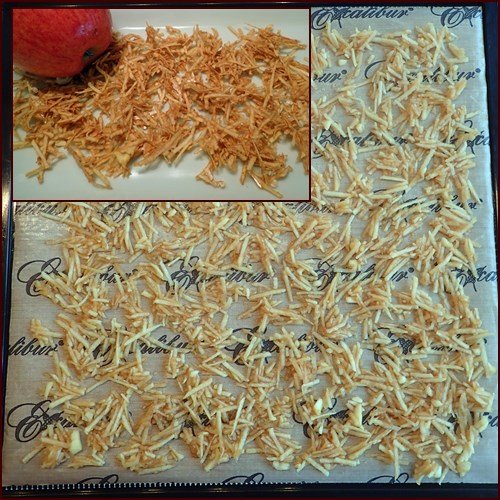
Photo above: Grated apples spread loosely on Excalibur dehydrator tray covered with nonstick sheet. Inset: Grated apples dried.
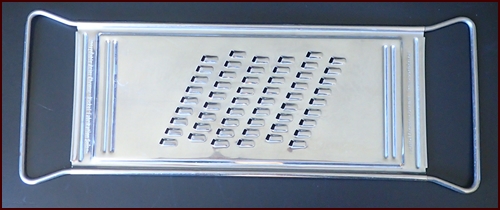
Photo above: Grater used to grate apples coarsely.
Step One: Peel and core apples, then grate them coarsely into a bowl of fresh-squeezed lemon juice. Stir as you go. Use one lemon per five apples grated. Lemon juice imparts a harmonious citrus taste to the apples. Although lemon juice is sometimes used to keep exposed apple flesh from turning brown due to oxidation, it is only moderately useful for that purpose.
Step Two: Spread grated apples and all juices on dehydrator trays covered with nonstick sheets. An Excalibur dehydrator tray will hold two to three grated apples.
Dehydrate at 135° F (57° C) for ten to fourteen hours.
Dried grated apples are wonderful for trail snacking. They juice up in your mouth faster than dehydrated apple pieces, and the lemon treatment imparts a nice citrus flavor.
They can also be heated and rehydrated to make trail tarts.
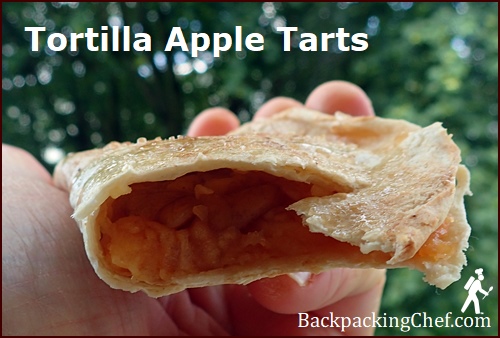
Photo above: Tortilla Apple Tart made by folding hot, rehydrated grated apples and walnuts into a tortilla. Excellent with cinnamon and sugar sprinkled on top, and lightly heated in foil.
Get the recipe for apple and other fruit tarts in this back issue of Trail Bytes: Tortilla Fruit Tarts.
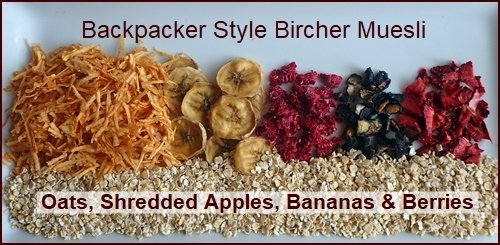
Photo above: Bircher Muesli, a no-cook breakfast which includes grated apples, berries, nuts, and oats. Rehydrated overnight, it’s ready to eat in the morning.
Get the recipe for this no-cook breakfast in this back issue of Trail Bytes: Bircher Muesli.

Subscribe to Trail Bytes, Chef Glenn’s free monthly newsletter, and get a free e-book, Home & Trail: An Introduction to Drying Food.
Dehydrating Apples – Baked
You’re going to love the results of this apple dehydrating project – hot pumpkin spice apples that you can heat up on the trail, or serve a la Mode with ice cream at home.
Ingredients:
- 4 – 5 lbs Apples (1814 – 2268 grams)
- ¼ cup Fresh Lemon Juice
- 2 Tbsp Raw Sugar, divided
- 2 tsp Ground Cinnamon
- ½ tsp Ground Ginger
- ½ tsp Ground Nutmeg
- ¼ tsp Ground Cloves
Yield: 8 servings of ½ cup (25 grams) each.
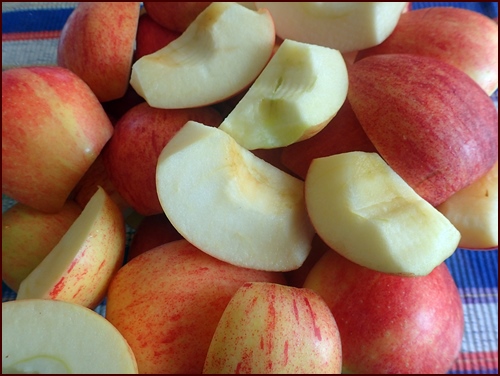
Photo above: Gala apples quartered with cores removed. Skins left on.
For this project, begin with four pounds (1814 grams) of apples. If you have a very large baking dish, you could start with five pounds (2268 grams).
Step One: Cut apples into quarters and remove cores. Then, slice quartered apples crosswise about ¼ inch thick. This is a little thicker than when drying uncooked apples. The extra thickness keeps the apples from getting mushy in the oven. Leaving the skins on also helps keep the apples intact as they cook.
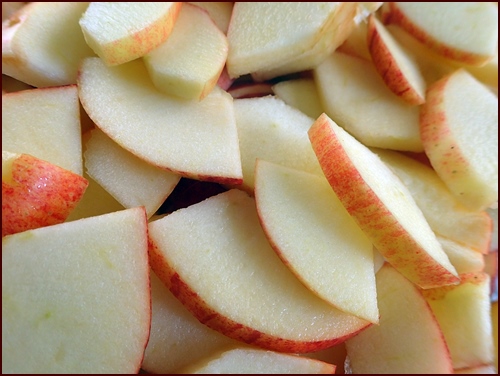
Photo above: Thickly sliced apples, ready for lemon juice, sugar, and pumpkin spices.
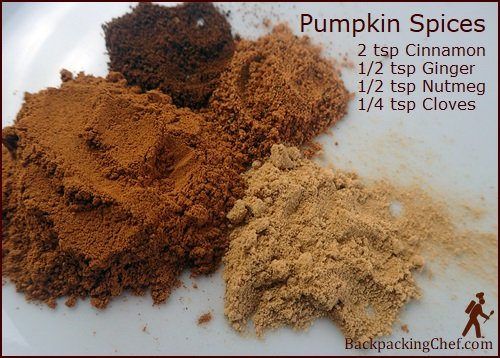
Photo above: Pumpkin spices include ground cinnamon, ginger, nutmeg, and cloves.
Step Two: Combine ground pumpkin spices: 2 tsp cinnamon, ½ tsp ginger, ½ tsp nutmeg, ¼ tsp cloves, and 1 Tbsp raw sugar.
Place apples in deep baking dish and stir in the grated peel of one large or two small lemons, plus the lemon juice. Desired quantity is a quarter-cup of fresh lemon juice.
Fully coat apples with pumpkin spices and sugar.
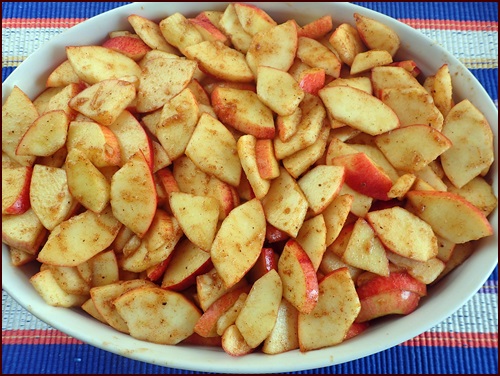
Photo above: Pumpkin spiced apples, ready for the oven.
Step Three: Cover baking dish with foil. Bake apples in preheated oven at 350° F (180° C) for one hour. At thirty minutes, stir apples to exchange the bottom apples with the top apples.

Photo above: Baked cinnamon spice apples on dehydrator tray.
Step Four: As soon as baked apples are cool enough to handle, place pieces in single layers, directly on mesh sheets of dehydrator trays.
While placing apple slices on the trays, put any small or mushy pieces in a separate bowl. You want to set aside enough soft apples and juices to make one tray of apple leather.

Photo above: Hand mashing the soft apple pieces and juices.
Step Five: Hand mash all juices, soft pieces, and one tablespoon of raw sugar, so that you end up with one cup of sweetened pumpkin spice apple slurry.
Spread apple slurry thinly on dehydrator tray covered with nonstick sheet.

Photo above: Mashed apple slurry on Excalibur dehydrator tray covered with nonstick sheet.
Step Six: Begin dehydrating apples and leather at 145° F (63° C) for the first two hours, then reduce temperature to 135° F (57° C) for the remaining time.
Total estimated drying time is ten to twelve hours.
If you start with four pounds of apples, the slices will take up three Excalibur dehydrator trays, and the mashed apple slurry will take up one tray. With five pounds of apples, five trays could be utilized, but you would have to start with a large baking dish.

Photo above: Finished drying apples.
Store dehydrated apple slices and leather in an airtight container. Allow dried apples to cool before placing in storage container, or condensation may form inside the container.

Photo above: To keep dried apple leather from sticking to itself in storage, fold it up in baking paper.
Rehydrating Pumpkin Spice Apples
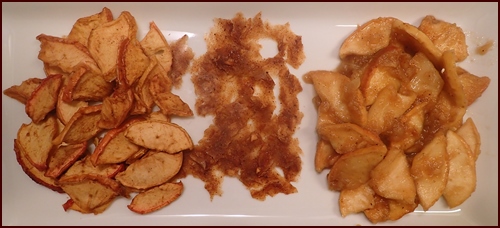
Photo above: (L) ½ cup (25 g) dried apple slices, (M) pieces of dried apple leather (7 g), (R) rehydrated with ½ cup (118 ml) hot water.
On the Trail:
Place ½ cup (25 g) of dried apple pieces, plus a few torn pieces of apple leather (7 g) in a pot with ½ cup water. Heat to desired temperature, allowing at least twenty minutes for apples to rehydrate. You can also rehydrate by adding boiled water to the ingredients in a thermos food jar.
At Home Serving Suggestion:
Heat and rehydrate apples and leather pieces as describe above, and serve a la Mode with ice cream.
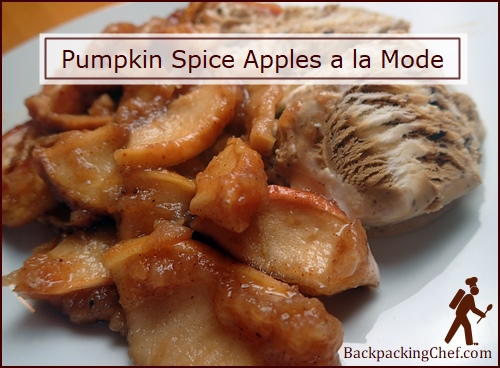
Photo Above: Pumpkin spice apples a la Mode. Highly recommended!
Dehydrating Apples – Stovetop
Precooking apples on the stove enables you to combine the apples with other fruits, like apricots, while creating sweet juices. Dried cooked apples are delicious for snacking, and they rehydrate well with hot or cold water.
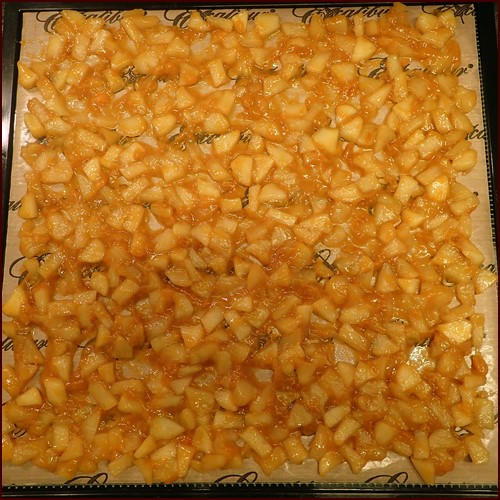
Photo above: Dehydrating cooked apples and apricots on Excalibur dehydrator tray covered with nonstick sheet.
Ingredients:
- 6 Apples
- 6 Apricots
- ½ large Lemon, juice and grated peel
Step One: Peel and cut apples and other fruits into pieces. If desired, leave the skins on.
Step Two: Place cut fruit, grated lemon peel, and lemon juice in a pot. Bring to a boil, and then reduce heat to low. Cook for ten minutes.
Step Three: After fruit cools, spread on dehydrator trays covered with nonstick sheets.
Begin dehydrating apples and apricots at 145° F (63° C) for the first two hours, then reduce temperature to 135° F (57° C) for the remaining time.
Total estimated drying time is twelve to fifteen hours. Drying time may be shortened by not overloading the trays.
Store dehydrated apples and apricots in an airtight container. Cool before placing in storage container.
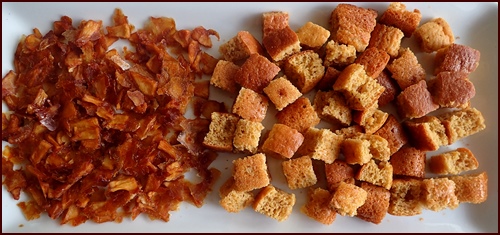
Photo above: A serving of backpacker pancakes with dried apples and apricots, before rehydrating.
Get the recipe for Backpacker Pancakes in this back issue of Trail Bytes: Backpacker Pancakes.
A thermos food jar is an excellent container to rehydrate dried fruits with hot or cold water.
Advertisement
Thermos Stainless King Stainless Steel Food Jar 24 Oz.
|
Disclosure: BackpackingChef.com participates in the affiliate program offered by Amazon. If you make a purchase after following the above link, I may receive a commission.
Dehydrating Applesauce
Dried applesauce can be enjoyed as a snack (applesauce leather) or can be rehydrated back into applesauce with hot or cold water.
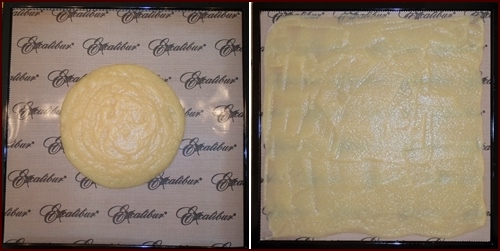
Photo above: One cup of applesauce spread thinly on Excalibur dehydrator tray covered with nonstick sheet.
Ingredients:
- 8 medium Apples, peeled and cored
- 1 cup Apple Juice
- ⅛ tsp Cinnamon
- Pinch of Salt
Step One: Cut apples into small pieces and place in pot with apple juice, salt and cinnamon. Bring to a boil and then reduce to low temperature. Cover pot and simmer for twenty minutes. Allow mixture to cool.
Step Two: Run cooled apple mixture through a blender and blend until smooth. Eight small to medium apples will produce approximately thirty-two ounces of applesauce before drying.
Yield: Eight apples yield approximately two cups of applesauce leather.
Step Three: Spread applesauce thinly, about ⅛ inch thick, on non-stick sheets. One cup of applesauce is a good amount to dry on one Excalibur dehydrator tray.
Dry applesauce at 135° for eight to twelve hours depending on the juiciness of the mixture. After about six hours, peel applesauce leather off the non-stick sheets and place directly on the mesh trays to expose the bottom to more air circulation.
Applesauce leather dries pliable, not brittle. Dry it thoroughly so that it is not sticky on the surface or still holding moisture in any thicker parts. To keep applesauce leather from sticking to itself in storage, fold it up in baking paper.
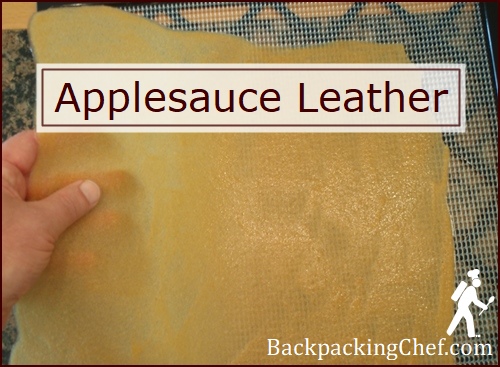
Reconstituting Dehydrated Applesauce
Combine applesauce leather with an equal quantity of water. ¾ cup each of water and leather (40 grams leather) is good for one serving, but you will have no problem eating a full cup. If serving cold, soak for ten to fifteen minutes and stir vigorously. If serving hot, combine with water and heat gently for ten minutes. Alternatively, reconstitute in a thermos food jar by adding boiled water to the leather.
FAQ About Dehydrating Apples

Ask Chef Glenn
If you have a question after reading this page, send it to me, and I’ll get back to you with an answer.
What
are the best apples for dehydrating?
What
are the best apples for dehydrating?
Gala and Honeycrisp apples are good for sweetness.
Granny Smith and Kanzi apples are good for tart flavor.
Pink Lady apples offer a good balance of sweet and tart.
How
long do apples take to dehydrate?
How
long do apples take to dehydrate?
If you slice the apples thinly, about ⅛-inch thick, they may be dry in as little as eight hours at 135°F (57°C). Drying time will take longer for thicker slices, twelve hours or more, and high humidity in the room can also extend drying times. Using a stacking type dehydrator, like a Nesco dehydrator, with more than six trays may also result in longer drying times, if you don’t rotate the trays from top to bottom.
When
are dehydrated apples done?
When
are dehydrated apples done?
Dried apples are still pliable when done. You can bend the pieces. Tear some pieces in half. There should be no visible moisture, and the insides should feel as dry as the outside. Squeeze several piece together. They should not stick together when you stop squeezing.
Once apples cool, store them loosely in an airtight jar. If any moisture appears on the inside of the jar after a few days, place the apples back in the dehydrator to continue drying.
Is
it better to dehydrate apples with or without the skin?
Is
it better to dehydrate apples with or without the skin?
Apple skins are nutritious and contain healthy flavonoids, so I usually leave mine on. Wash the apples under warm running water to remove dirt, pesticides, and any wax coating. Pat dry with a clean dish towel before slicing.
Explore More...
Dehydrating Fruit Table of Contents
Next up: Dehydrating Apricots
Article, Dakota State University Extension: Dehydrating Apples
Recipes for Adventure Books
Share this page with friends on social media.
Free E-book & Newsletter
Free with Trail Bytes subscription.
Dehydrating Food from A–Z

